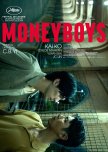Esta resenha pode conter spoilers
Hidden Truth
Originally, Yi wanted to shoot the film in the PRC. In mainland China, homosexuality is not forbidden, but it is treated as taboo. However, after the temporary disappearance of actress Fan Bingbing, there was an appeal from the film bureau not to make certain films. For this reason, Yi rescheduled seven months before shooting began and decided to move to Taipei, Taiwan. A two-year casting process in China had preceded, but actors had dropped out after accepting commitments. According to Yi, it would not have been possible to engage Taiwanese actors because the audience would have noticed the language difference immediately. So for pragmatic reasons, among others, the Chinese actress Zeng Meihuizi took on three roles in Yi's film.
Filming took place over 39 shooting days from May to July 2019 in Taiwan. The production was supported by the Austrian Film Institute, the Vienna Film Fund, Eurimages, Creative Europe MEDIA, Aides aux cinémas du monde, Taipei Film Commission, Belgian Tax Shelter, the Ministry of Culture of Taiwan and Totem. The Austrian Broadcasting Corporation and Arte were also involved.
The film is about the tension between traditional life with children and starting a family and free life in the anonymity of a city. He found a beautiful, unobtrusive aesthetic form for this tension. In the film, one can clearly see how quickly progress in China has torn the generations apart.
The film is visually appealing and cleverly deals critically with the issues of prostitution and homosexuality. However, a few lengths and many plot lines that go nowhere ensure that the hoped-for social criticism and tragedy of the film fizzle out.
The film's clever use of colour should be emphasised. Different spaces and places (e.g. the village, the hip spaces of the big city) are characterised by colours in the film, which also mix again and again in individual scenes. The director is particularly interested in the colour gradients, the "movements" between the different spaces. The complexity of the film saves it from obvious genre formulas, the "sense of images" protects it from narrative conventions. In the process, the director's visual interest in the cinematic world creates a film that is as consistently ordered as it is emotionally stirring, penetrating the rigid structures of world cinema.
Filming took place over 39 shooting days from May to July 2019 in Taiwan. The production was supported by the Austrian Film Institute, the Vienna Film Fund, Eurimages, Creative Europe MEDIA, Aides aux cinémas du monde, Taipei Film Commission, Belgian Tax Shelter, the Ministry of Culture of Taiwan and Totem. The Austrian Broadcasting Corporation and Arte were also involved.
The film is about the tension between traditional life with children and starting a family and free life in the anonymity of a city. He found a beautiful, unobtrusive aesthetic form for this tension. In the film, one can clearly see how quickly progress in China has torn the generations apart.
The film is visually appealing and cleverly deals critically with the issues of prostitution and homosexuality. However, a few lengths and many plot lines that go nowhere ensure that the hoped-for social criticism and tragedy of the film fizzle out.
The film's clever use of colour should be emphasised. Different spaces and places (e.g. the village, the hip spaces of the big city) are characterised by colours in the film, which also mix again and again in individual scenes. The director is particularly interested in the colour gradients, the "movements" between the different spaces. The complexity of the film saves it from obvious genre formulas, the "sense of images" protects it from narrative conventions. In the process, the director's visual interest in the cinematic world creates a film that is as consistently ordered as it is emotionally stirring, penetrating the rigid structures of world cinema.
Esta resenha foi útil para você?




